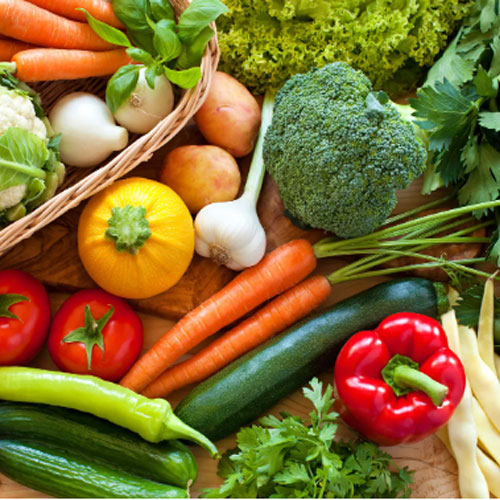Phone: +91-9890481729

Vegetables are edible plants that are typically consumed for their nutritional value and savory flavors. They are an essential part of a healthy diet and provide a wide range of vitamins, minerals, fiber, and other beneficial compounds. Vegetables come in various shapes, sizes, and colors, and they can be enjoyed in numerous culinary preparations.
Here are some key points about vegetables:
1. Types and Varieties: Vegetables encompass a wide range of plant-based foods. Common types of vegetables include leafy greens (such as spinach, kale, and lettuce), cruciferous vegetables (such as broccoli, cauliflower, and cabbage), root vegetables (such as carrots, potatoes, and beets), nightshade vegetables (such as tomatoes, peppers, and eggplants), and many others like peas, corn, onions, and mushrooms. Each vegetable has its own unique nutritional profile and flavor.
2. Nutritional Value: Vegetables are packed with essential nutrients that are vital for good health. They are excellent sources of vitamins, including vitamin C, vitamin A, vitamin K, and several B vitamins. Vegetables also provide minerals like potassium, magnesium, and folate. Additionally, they are low in calories and rich in dietary fiber, which aids in digestion and promotes satiety.
3. Health Benefits: Regular consumption of vegetables is associated with numerous health benefits. Their nutrient density and high fiber content support overall well-being and help maintain a healthy weight. Vegetables are rich in antioxidants, which help protect against cellular damage and reduce the risk of chronic diseases, including heart disease, certain types of cancer, and age-related macular degeneration. Different vegetables offer specific health benefits due to their unique nutrient profiles.
4. Culinary Uses: Vegetables can be enjoyed in various ways, both cooked and raw. They can be steamed, boiled, roasted, grilled, stir-fried, or eaten raw in salads and as snacks. Vegetables can be used as main ingredients in dishes or as flavorful additions to soups, stews, stir-fries, pasta, and casseroles. They can also be blended into smoothies or juiced to create refreshing beverages.
5. Selecting and Storing: When selecting vegetables, look for ones that are fresh, firm, and free from blemishes or signs of decay. The color and texture should be vibrant and appealing. Different vegetables have specific storage requirements. Leafy greens, for example, are best stored in the refrigerator, while root vegetables can be kept in a cool, dark place. It's advisable to consume vegetables as soon as possible to retain their freshness and nutritional value.
6. Seasonality: Vegetables have different seasons of peak freshness and availability. Eating vegetables that are in season often means they are at their best quality, flavor, and nutritional content. Additionally, buying local and seasonal vegetables supports local farmers and reduces the environmental impact associated with long-distance transportation.
Incorporating a variety of vegetables into your diet is crucial for overall health and well-being. Their nutritional richness and versatility make them an essential component of balanced meals. By exploring different vegetables and culinary techniques, you can enjoy their flavors and harness their numerous health benefits.
Quick Enquiry
Copyright © 2023 Swojas Exports| All Rights Reserved. Website Designed & Promoted by Web2Export

